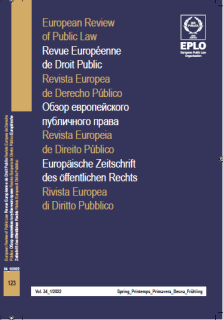
Wars and Fights against Pandemics: The Re-emerging Role of the State as Guarantor of Last Resort
Full Professor of Administrative Law at the University of Urbino Carlo Bo, Italy
The global health emergency caused by Covid-19 urged States to find new ways of protecting their citizens and regulating their lives, to cooperate with each other, to change priorities on their political agendas. Probably, the pandemic will change the course of history. The pandemic woke up the State from its “dormant” status. The State is regaining an important and major role as guarantor of last resort, especially in the fields where the European Union (at this stage of European integration) does not and cannot act as such: external security, internal security and public order, safety of its citizens, State economic interests in the so-called “strategic” sectors. It may be questioned if the role of the State as guarantor of last instance is unchallengeable, or if the European Union may, little by little, acquire such a role. Although this would be advisable, at this stage of European integration the State remains the guarantor of last instance, for at least three reasons: the special allegiance between the State and its citizens, the national solidarity and the possibility to use emergency powers.
L’urgence sanitaire mondiale provoquée par le Covid-19 a poussé les Etats à trouver de nouveaux moyens de protéger leurs citoyens et de réglementer leur vie, à coopérer entre eux, à changer les priorités dans leurs agendas politiques. La pandémie va probablement changer le cours de l’histoire. La pandémie a réveillé l’Etat de sa “torpeur”. L’Etat est en train de retrouver un rôle important et majeur en tant que garant de dernier recours, en parti-culier dans les domaines où l’Union européenne (à ce stade de l’intégration européenne) n’agit pas et ne peut pas agir en tant que tel: sécurité extérieure, sécurité intérieure et ordre public, sécurité de ses citoyens, intérêts économiques de l’Etat dans les secteurs dits “stratégiques”. On peut se demander si le rôle de l’Etat comme garant en dernier ressort est incontestable ou si l’Union européenne peut acquérir, peu à peu, un tel rôle. Bien que cela soit souhaitable, à ce stade de l’intégration européenne, l’Etat reste le garant de dernière instance, pour au moins trois raisons: l’allégeance particulière entre l’Etat et ses citoyens, la solidarité nationale et la possibilité d’utiliser des pouvoirs d’urgence.





















